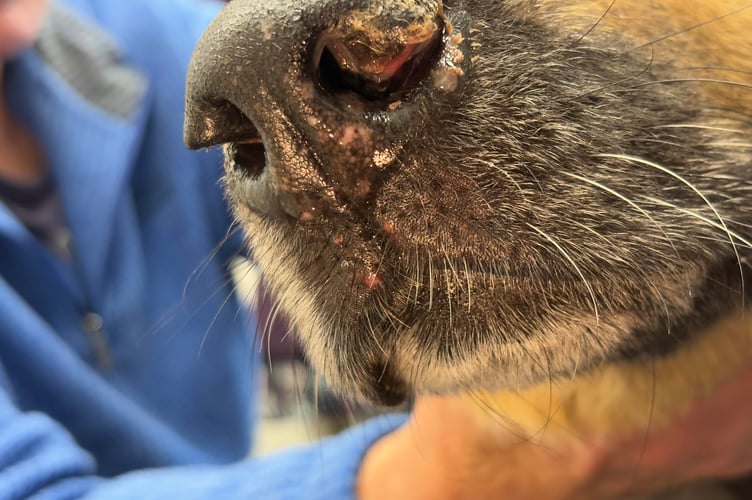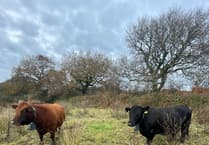Bear’s previous life was working for Guide Dogs for the Blind Association. He did a fantastic job for a long time, particularly flying the flag for the hardworking German Shepherds in amongst all of those cute Labradors!
Last year Mr & Mrs Grahamslaw offered to give him the retirement he deserved, and he has been thriving with them. However, the years of hard work have caught up with him, and he has been a regular visitor to our Kingsbridge practice.
After a month of having a dry nose, Bear progressed to crusting lesions on his nose and a mucopurulent (ahem…’snotty’) discharge, as well as a nosebleed. The dark colour of his nostrils turned a light pink colour in places. This inflammation started to affect his lip as well and he was starting to feel miserable.
So, we were asked to do our best to help him feel better. Our noses are full of loads of different bacteria, but they are also very good at filtering out the bacteria and preventing infections in normal healthy animals (us included!). So, the snotty nose was a sign that something else was going wrong. In situations like this we have to consider all the possible causes. Could there be an underlying fungal infection, or a virus? Was there a growth or tumour developing in the nose? Was an auto-immune condition affecting him? Had he accidentally snorted something up his nose that had got stuck?

In this case, after reading through all his medical notes from his time with the Guide Dogs, we found a clue for what could be the problem. He had previously had some similar symptoms, and had seen a Veterinary Dermatologist ‘up country’ to examine at it. We decided it was likely to be a recurrence of the same problem. The symptoms were consistent with a condition called Mucocutaneous Pyoderma.
We cultured the bacteria and chose an appropriate antibiotic, which proved successful in treating his condition. Other investigative options at our disposal were endoscopic examination of his nasal sinuses (long thin camera up his nose), CT scan of the head (big circular machine he passes through to get 3D images of inside his head), and biopsy of the nose (surgical sample and testing at a laboratory) – we would have used these if necessary, but of course did not want to burden Mrs Grahamslaw or Guide Dogs with any unnecessary expense, but most importantly, we didn’t want to put Bear through any unnecessary tests.
Bear is doing well now, but still visits us regularly to make sure he is living a comfortable life and his other conditions are well managed.
One final point - we are lucky here at South Moor Vets because we have the only Veterinary Dermatologist in Devon working for us. So, if this case had, or does, turn out to be more complex, we can ask Jess Myers-Allen to solve it for us!





Comments
This article has no comments yet. Be the first to leave a comment.